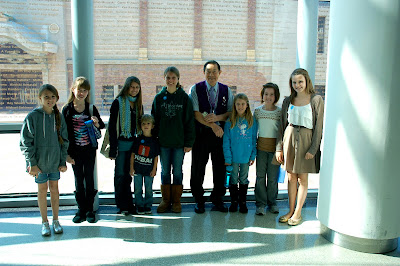The first portion of the tour was participating with hands-on Taiko drumming! That was a lot of fun! Here are a couple of videos.
Our tour guide was named James Tanaka and in 1942 he was in the Idaho concentration camp when he was only 7, 8, and 9 years old. He was had tons of information to share with us and it was was fascinating but sad to hear the true history coming from a person with firsthand experience.
 |
| James Tanaka standing next to his name engraved on the glass wall of the museum. |
Here are some facts we learned:
*Up to 110 people were locked up in the barracks at his camp.
*The temperature was minus 36 degrees and they had one potbelly stove that burned coal.
*The lumber that was used to build the barracks was damp when they were building so the wood shrunk once the building was up.
*They ate stew made of tomatoes and Viennese sausages everyday.
*People weren't allowed to have cameras to take photos so they drew pictures.
*There was no privacy whatsoever in the bathrooms.
*The only people that were separated from their family were Japanese-German and Japanese-Italians because they had leadership. Abc list nationals were interned in internment camps.
*Japan has lots of natural disasters because Japan is an island a thousand miles away from the capitol and government. They had to rely on each other and the world. "We and us concept," said James.
*At the camps they had gunny sacks filled with straw for beds.
*There was a watch tower/guard tower with soldiers with guns.
*The government used the term "aliens" instead of American Citizens because aliens made it sound more reasonable for them to be doing what they were doing.
*After the Japanese-Americans were set free, then the U.S. expected them to be loyal to America by serving in the army.
*Even if you are born in Japan but are mixed then you aren't considered Japanese.
*You have to know 8000 characters in Chinese and Japanese language.
*The Japanese were sent to work on the sugar beet farms. They helped make rubber out of the sugar beets and this actually helped to end of war.
*In the early 90's President Bush wrote an apology letter to all the Japanese-Americans who'd been in the camps (who were still living) along with $20,000 dollars. They could have sued for much more money.
*A woman who saw the children going to the camp gave them her address to send her letters. The letters are now complied into a book called Dear Miss Breed.
*Another good book about this time in history is Farewell to Manzanar.
post by Carly



No comments:
Post a Comment